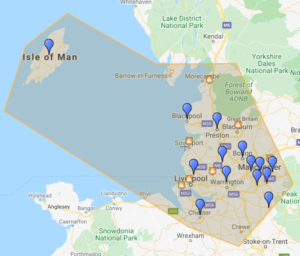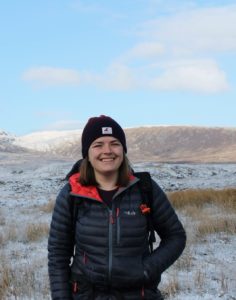Peer assisted learning in the north west
Health Education England, North West, funded data gathering project
junior doctors are feeling compelled to create their own opportunities to practice core teaching skills
The North West
There has been a burgeoning of foundation doctor led peer teaching programmes in the North West in recent years. This demonstrates that junior doctors are not only feeling compelled to create their own opportunities to practice core teaching skills but that they also have a significant enthusiasm for delivering teaching.
All foundation doctors are required to complete a “developing the clinical teacher tool” (DCT) as part of the suite of work based assessments during foundation (Health Education England, 2020). But this is the extent of the requirements for gaining these key skills at this level.
Below you will find a map of activities across the region as well as some case studies of exemplar work happening.

.
“PAL can be a useful vehicle for medical students and doctors to share the “stories” of their working experiences and learn ways of thinking about complex problems they will encounter.”

North West Review
Peer learning
There is a wealth of literature available on the advantages of peer assisted learning (PAL) in healthcare settings. In learning we create cultural tools to help us make sense of the world, with language being the most powerful of these (Aubrey and Riley, 2018). PAL can be a useful vehicle for medical students and doctors to share the “stories” of their working experiences and learn ways of thinking about complex problems they will encounter. Vygotsky, the Godfather of social learning theory, identified a learner’s ‘zone of proximal development’, which describes the growth achieved by a learner with the help of other individuals close to them with, usually those with identified social or academic similarities. This has historically been taken as one of the fundamental tenets of peer-learning, given the assumption that we are likely to find more commonalities with our peers than formal teachers and faculty.
PAL in the NW
At intervals, since 2017, we have collected data from the North West PiPs showcase , foundation teams and through the Foundation forum in order to keep a record of what PAL activities are occurring around the North West.
These activities are limited to the data we can collect from these sources. This means that we do not have a complete picture of what is happening, but a snapshot of what is presented to us.
Many “formal” (with the support of administrators and foundation teams) and “informal” (those operating outside of foundation training) programmes are happening around the region. From journal clubs, to bleep training to regional projects. Foundation doctors are finding time, resources and energy, on top of busy clinical work to provide teaching and learning opportunities for their peers.
If you would like to share what you are up to with the rest of the region on the PiPs platform please get in contact.
Next, a couple of examples of PAL projects from around the region…
Ray Daniels
“Most medical students have little to no experience in these subjects before their placements and these placements have some of the largest amounts of new content/skills to learn out of all subjects.”

SUBHEADING
families and children, an online learning project
By Isla Kemp
The families and children teaching project at Preston came about from discussions with medical students about how they felt that they wanted some additional support with paediatrics/obstetrics. Most medical students have little to no experience in these subjects before their placements and these placements have some of the largest amounts of new content/skills to learn out of all subjects.
A group of FY1s planned a teaching program with the aim of complementing the Manchester medical school family and child block. This takes up half of 4th year for Manchester medical students and covers paediatrics, obstetrics and gynaecology and GP. We designed a 12-week teaching program covering 4 sessions on each topic. Due to covid restrictions the sessions were planned to be over zoom.
We found running the program to be quite a steep learning curve. Coordinating and organising remotely proved occasionally challenging and we found attendance fluctuated with students attending in high numbers one week and then low the next.
To collect feedback we sent out surveys at the end of each session. To try and increase the numbers of students filling out feedback we would only send out slides/resources if they filled in the form.
Overall, we received positive feedback with students having found the obstetrics and case-based sessions the most beneficial.
Feedback suggested running all sessions as case-based and that we should increase promotion of sessions.
Going forward we are aiming to repeat the sessions again this year working with the head of medical students at RPH and some current FY1s to create an ongoing program of teaching that will hopefully run for years to come.

.
SUBHEADING
PAL at East Cheshire
By Antoinette Yoxall, clinical fellow
The Peer Assisted Learning (PAL) scheme at East Cheshire has been a valuable addition to the foundation teaching programme. Our peer led sessions allow current foundation trainees to teach and present to our colleagues within a safe and comfortable environment. It provides an opportunity for those who are nervous when teaching and presenting to work on their skills and increase their confidence, whilst allowing those who are already comfortable to add to their portfolios and gain valuable teaching experience.
“Our peer led sessions allow current foundation trainees to teach and present to our colleagues within a safe and comfortable environment.”

All sessions are observed by a senior colleague, providing the opportunity for personalised feedback and DCT forms for the foundation portfolio.
Teaching topics are decided by the foundation trainee themselves which has led to an interesting array of topics, including sports medicine, nutrition and prison medicine. A wide range of teaching styles have been adopted, including quizzes and cut-and-stick activities, leading to these sessions being some of the most well received in the programme.
I really enjoyed the peer led teaching sessions and found them extremely beneficial in improving my presentation and teaching skills.


